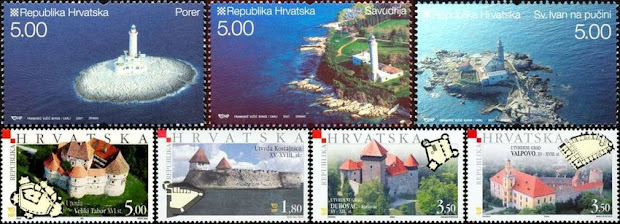Enough about politics, it's time for a culinary event: cleaning fish. Don't read or scroll down if you can't stand bloody pictures.
First a general observation. Buy one, get two. Buy two, get three. Supermarkets in Western Europe try to attract customers that way, but it is unheard of in Croatia. Only recently supermarkets started to discount certain products. In pubs it is not uncommon to see on the menu:
Karlovačko 15 kuna (0,5 liter)
Karlovačko 30 kuna (1 liter)
I thought the capitalist mentality is inborn, but some nations apparently don't have a knack for trade. Perhaps half a century of communism is enough to damage the fragment of DNA that is responsible for commerce. Karlovačko, by the way, is a beer.

I went to Dolac, Zagreb's central market, this morning to get fish. In the
ribarnica (an indoor fish market that unfortunately lacks any Mediterranean ambiance) I bought this well size mackerel (40 centimeters) for only 18 kuna.

When home, I sliced it open and saw I got more fish than I had expected. The mackerel, when caught, was actually half way swallowing a smaller fish, so I could tell from the little fish tail sticking out of the mackerel's mouth. In it stomach I found remains of an earlier meal. A bit gross, but the mackerel itself was, in a word, super fresh. I could have made sashimi with it. Bit of soy sauce, bit of wasabi.... delicious!


 Traditionally, at the end (or beginning) of Ulica hrvatske bratske zajednice the flag of the visiting country's guest is hoisted. So it was when Chinese president Hu Jintao came to Zagreb, and so it was for someone from some country. By the moon I could tell the visitor represents an Islamic country, but which? After bit of googling I found the answer: Turkmenistan. The always informative website of the Croatian government provides pictures for media use, so I felt free to show Sanader and the gentleman from Turkmenistan shaking hands.
Traditionally, at the end (or beginning) of Ulica hrvatske bratske zajednice the flag of the visiting country's guest is hoisted. So it was when Chinese president Hu Jintao came to Zagreb, and so it was for someone from some country. By the moon I could tell the visitor represents an Islamic country, but which? After bit of googling I found the answer: Turkmenistan. The always informative website of the Croatian government provides pictures for media use, so I felt free to show Sanader and the gentleman from Turkmenistan shaking hands. I bet we will read later that Turkmenistan supports Croatia's bid for EU membership. It's good to have some friends left. This article from Jutarnji list paints a gloomy picture of Croatia's international position. The essence: EU diplomats recommend Sanader not to blame Slovenia for everything but to finally get some serious work done (the over and over again mentioned corruption, crime, Tribunal, state run firms, violent and racist football fans...).
I bet we will read later that Turkmenistan supports Croatia's bid for EU membership. It's good to have some friends left. This article from Jutarnji list paints a gloomy picture of Croatia's international position. The essence: EU diplomats recommend Sanader not to blame Slovenia for everything but to finally get some serious work done (the over and over again mentioned corruption, crime, Tribunal, state run firms, violent and racist football fans...). Traditional allies like Germany, Austria, Italy, Luxembourg and Slovakia (new to me) have turned their back on Croatia or pay lip service at best. Croatia is a country without friends.
Traditional allies like Germany, Austria, Italy, Luxembourg and Slovakia (new to me) have turned their back on Croatia or pay lip service at best. Croatia is a country without friends.






























